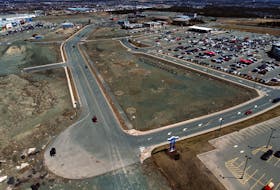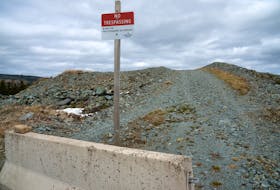In 2011, then-Newfoundland and Labrador Natural Resources Minister Shawn Skinner signed off on a recommendation to Cabinet. It suggested premier Kathy Dunderdale be authorized to sign a “commitment letter” to help in Muskrat Falls financing.
At the Muskrat Falls Inquiry, Skinner said he had a “high-level” understanding of the hydro megaproject at the time, and the related risks.
He understood the province was on the hook for cost overruns.
“Whether I would say they were higher, lower, likely or not, they were a possibility. That’s the understanding I took,” he said Friday. “I wouldn’t want to quantify they were more likely or less likely. They were possible.”
Risk for the construction project were not talked about in terms of “tactical risk” or “strategic risk” in his briefings, he said. And he hadn’t heard of a “probability factor” or “P-factor,” trusting both the Department of Finance and Nalcor Energy to test the estimates.
He didn’t check with Finance himself to confirm that work was being done.
The “commitment letter” states the province’s intent to, among other things: approve new Nalcor subsidiaries; ensure ratepayers on the Island will be captive to Newfoundland and Labrador Hydro and provide sufficient revenue; and says the province will directly invest, covering project contingencies.
Related story:
The document with Skinner’s name, recommending the commitments be made, also warns “an investment in Nalcor may raise concerns with bond rating agencies and could potentially stress the province’s credit rating, particularly in the event of adverse developments such as construction delays or cost overruns. In addition to the deterioration of liquidity, this project-related borrowing could also impair government’s borrowing capacity for general operations, or increase the interest cost of future debt issues.”
It lists actions that could help protect the province’s finances, including negotiating a loan guarantee with the federal government and assuring Nalcor is providing enough each year back to the province to not have interest and debt-servicing costs covered by taxpayers.
Skinner said he expected to receive accurate information in his briefings, in order to make related decisions.
“In terms of fulsomeness, there would be levels of detail that in fairness to whoever was doing the presentation, I wouldn’t necessarily as minister need to get down into the weeds, I’ll call it, but there would be a level that I would need to understand and sometimes that would be evident by the presenter and I’d get it, and sometimes you might have to dig a little deeper,” he said. “But, you know, I was briefed. And I understood I wasn’t always being given all the level of detail, because it wasn’t relevant to me as — when I say it wasn’t relevant it wasn’t something I needed to know, I needed a high-level understanding.”
On the PUB review
Skinner got the ball rolling in May 2011 on a reference to the Public Utilities Board (PUB), to say if the Muskrat Falls project was a better option for provincial ratepayers than an “isolated island” option for power development.
He testified he knew when that referral was made, it would be a “challenging timeframe” for the regulator to report back by the end of the year. But he believed it could be done.
Asked about Nalcor not filing a main document for that review until even he had left (in fallout from the fall 2011 election), Skinner said he was not made aware of the delay. He also testified he knew the PUB review was expected to use “decision gate two” estimates for their review, but he was not aware that meant numbers representing only about five per cent of project engineering completed.
As Commissioner Richard LeBlanc has heard, the PUB requested an extension for their work, was granted a three-month extension by then-minister Jerome Kennedy. Another extension was not granted. The Board ultimately found more information was needed to come to a proper conclusion on the ‘either-or’ reference from government.
The Muskrat Falls project was pursued.
Skinner was preceded on the stand by Paul Lemay. Lemay was chief estimator for SNC-Lavalin on the project and gave only partial testimony. There was discussion of further testimony either “in camera” or in public. LeBlanc indicated he would be hearing more from intervening lawyers on the subject, deciding Lemay will be rescheduled to a later date.

![['Shawn Skinner']](https://saltwire.imgix.net/skinner.jpg?cs=srgb&fit=crop&h=568&w=847&dpr=1&auto=enhance%2Cformat%2Ccompress)







